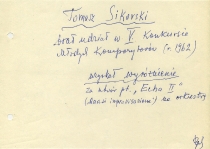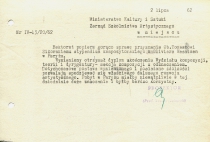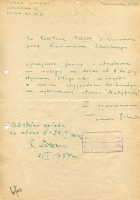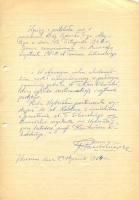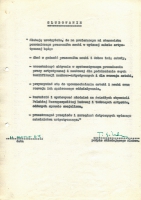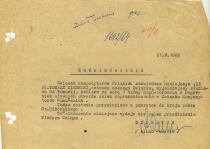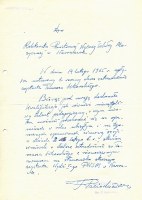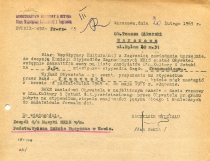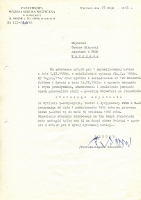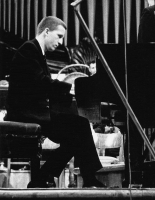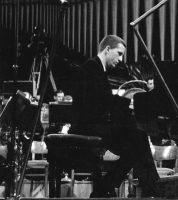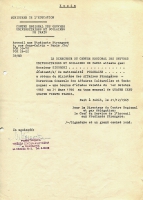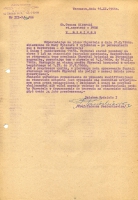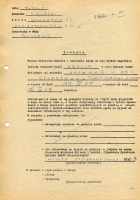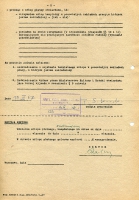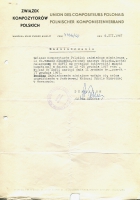1961
Premiere of Echoes I at the Chamber Hall of the National Philharmonic during a Young Composers’ Concert.
December
Concert of students of the State School of Music at the Prague Conservatory. Tomasz Sikorski performs Johann Sebastian Bach’s Goldberg Variations and Sergei Prokofiev’s Sonata No. 7.
1962
11 June
Sikorski graduates in composition with honours.
Echoes II wins him a prize at the 5th Young Composers’ Competition.
2 July
Right after finishing his composition studies Sikorski has a chance to go on a scholarship to Paris to study with Olivier Messiaen. Teodor Zalewski, Deputy Rector, writes a letter to the Minister of Culture and Art supporting Sikorski. However, in the end Sikorski does not go to Paris.
He makes his Warsaw Autumn debut as a pianist, performing with the German mezzo-soprano Carla Henius and Zygmunt Krauze Dieter Schönbach’s Lyrische Gesange II, presented for the first time in Poland. Initially, Krauze and Sikorski were to have played Pierre Boulez’s Structures II, but the plan was abandoned.
1961–1963
Sikorski works in the Polish Radio Experimental Studio on Echoes II for 1, 2, 3 or 4 pianos, chimes, 2 gongs, 2 tam-tams and tape.
1963
21 January
Tomasz Sikorski becomes a candidate member of the Polish Composers’ Union.
His Echoes I is performed at the Polish Culture Centre in Vienna. The pianist is Jerzy Gajek.
29 September
Tomasz Sikorski makes his Warsaw Autumn debut as a composer with Antiphons. He takes part in the premiere, playing the piano.
1 October
Sikorski begins working at the State School of Music as a ‘teacher of subjects’. He teaches sheet music reading and instrumentation.
Together with John Tilbury and Zbigniew Rudziński he founds an ensemble playing contemporary music and 20th century classics. The name of the ensemble, ‘Warsztat Muzyczny’ (‘Musical Workshop’), is suggested by John Tilbury. Soon they are joined by Zygmunt Krauze.
1964
6-20 January
The composer leaves for London in connection with a performance of Antiphons.
15 January
Premiere of Echoes II featuring Zygmunt Krauze and John Tilbury. The programme of the concert, organised by PWM Edition and taking place at the National Philharmonic Hall, also features Bogusław Schaeffer’s Four Pieces for String Trio and Krzysztof Penderecki’s Death Brigade.
29 January
A letter signed by Tadeusz Paciorkiewicz, Dean of Faculty I, reads as follows:
The Board of the Faculty has decided to request the Rector to appoint T. Sikorski assistant lecturer at Prof. Kazimierz Sikorski’s Department.
15 February
Tomasz Sikorski is appointed assistant lecturer at the Department of Composition.
22 February
Tomasz Sikorski once again applies for an overseas scholarship to study composition with Olivier Messiaen.
12 March
The composer takes an oath as an ‘auxiliary academic staff member at a higher education art institution’.
25 May-5 June
Sikorski goes to Romania on an exchange as a delegate of the Polish Composers’ Union. As we can read in a certificate issued by the PCU, ‘he takes with him one audio recording of his own works to present them to the Romanian Composers’ Union’.
29 September
Premiere of Prologues during a Warsaw Autumn concert. The performance features the National Philharmonic Female Choir and Instrumental Ensemble conducted by Roman Kuklewicz as well as John Tilbury and Tomasz Sikorski at the pianos.
13 November
Tomasz Sikorski becomes a full member of the Polish Composers’ Union. He submits the following works to obtain full membership: Antyphons, Sketches, Strettas and Echoes II (quasi improvvisazione).
1965
10-25 January
The composer leaves for Belgium and Germany.
25 January
Das neue Werk, a Norddeutscher Rundfunk programme features a concert, broadcast by the radio from Hamburg, which includes performances of Włodzimierz Kotoński’s Microstructures for tape and Tomasz Sikorski’s Echoes II. Brothers Aloys and Alfons Kontarsky play the pianos, and Christoph Caskel plays the percussion.
February
Tadeusz Paciorkiewicz, Dean of Faculty I, writes a letter to the Rector, putting forward a motion that ‘Tomasz Sikorski be promoted to the position of senior assistant lecturer’.
15 February
Tomasz Sikorski is appointed assistant lecturer for another year until 15 February 1966.
20 February
Tomasz Sikorski learns that he has been ‘provisionally shortlisted by the Ministry of Culture and Art for a French government scholarship for two-and-a-half months’. In the end the scholarship is granted for three months.
25 May
Tomasz Sikorski is appointed for three years, as of 1 October 1965, senior assistant lecturer at Faculty I of the State School of Music in Warsaw.
30 September
Concerto Breve is premiered during a concert at the Warsaw Autumn Festival. The premiere features the Silesian Philharmonic Orchestra conducted by Karol Stryja and Tomasz Sikorski at the piano.
1 October-31 December
Sikorski is in Paris on a French government scholarship. He and Zbigniew Rudziński stay in separate spacious studio flats on the bank of the Seine at Rue de l'Hôtel de Ville 18. Officially, they are studying with Nadia Boulanger, but their meetings with the famous teacher are sporadic.
10 November
Tomasz Sikorski’s Concerto Breve and Prologues, as well as Zbigniew Rudziński’s Contra Fidem and Moments Musicaux are played during a public event in Paris.
1966
The ISCM Festival in Stockholm features a concert of Tomasz Sikorski’s works.
1 January-31 March
Sikorski and Rudziński manage to have their scholarships extended for another three months.
February
Tomasz Sikorski meets Pierre Boulez. This is how he describes the event in a letter to Alina Sawicka and Leonia Piwkowska:
I met Boulez in (early) February. He is a very nice man. Totally without this firmness and severity he has on the stage.
April
Shortly after returning from Paris, Sikorski moves to another flat in Warsaw, at Kozietulskiego 6.
12 April
He takes part in a meeting of the Warsaw Autumn Repertoire Committee. The chair at that time is Kazimierz Serocki. Thus Tomasz begins his work for the Committee, which will last until 1974.
13 April
Sikorski applies for unpaid leave until the end of the academic year (31 May 1966). His request is granted.
1 July
The composer leaves for London.
22 September
Sequenza I is premiered at the Warsaw Autumn Festival by the RAI Symphony Orchestra from Turin conducted by Andrzej Markowski.
31 October
The composer asks the Board of the Faculty to initiate the procedure that will lead to his appointment as assistant professor. The request is denied, because Sikorski does not meet the formal requirements. In the 1965-1966 academic year he was on a scholarship in Paris and after his return he asked for unpaid leave. He did not undertake teaching duties, which was necessary for the appointment procedure to begin.
1967
Sikorski takes part in the work of the Warsaw Autumn Repertoire Committee.
17-25 February
He goes to Helsinki to take part in the ‘Ung Nordisk Musik’ (‘Young Nordic Music’) Festival.
14-18 April
Sikorski goes to London to take part in a recording for the BBC Radio. He performs and records his Sonant.
18-22 May
The composer leaves for Denmark and the Federal Republic of Germany for a concert and recording of his works.
20 September
Sonantis performed for the first time in Poland at the Warsaw Autumn Festival. The performance at the State School of Music concert hall features the composer himself.
2 October
Echoes IIis performed in Los Angeles by the percussionist Kenneth Watson, pianists Michael Tilson Thomas and Richard Grayson as well as Paul Beaver in charge of the tape.
Tomasz Sikorski and Zbigniew Rudziński found the ‘Ad Novum’ ensemble.
11-17 December
Sikorski goes on an exchange to Bulgaria. He is delegated as a member of the Warsaw Autumn Repertoire Committee to a festival of Bulgarian chamber music in Sofia.
1968
Sikorski takes part in the work of the Warsaw Autumn Repertoire Committee.
21-28 April
Sikorski goes to Hungary to participate in the Congress of Young Composers and Musicologists from Socialist Countries in Eger.
30 September
In an unpleasant atmosphere Tomasz Sikorski officially ends his collaboration with the State School of Music, where he has taught for five years.
He will never work as an academic or teacher again.
18 November
Sikorski sends a telegram to the Rector of the State School of Music, Teodor Zalewski:
I KINDLY ASK YOU SIR IF YOU ARE FAMILIAR WITH THE CUSTOM OF REPLYING TO LETTERS = TOMASZ SIKORSKI.
1969
Sikorski continues his work in the Warsaw Autumn Repertoire Committee.
5 October
Zbigniew Rudziński and Jerzy Witkowski premiere Diaphony during a concert in Baden-Baden.
24 November
The Baird Recital Hall, University at Buffalo, is the venue of a performance of Intersections for four percussionists written one year earlier. The performers are: Edward Burnham, Gerald Cash, Jan Williams and William Furioso. The concert is recorded.



